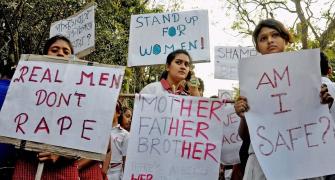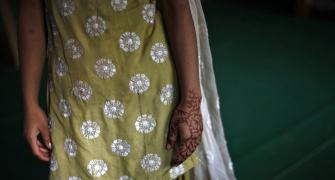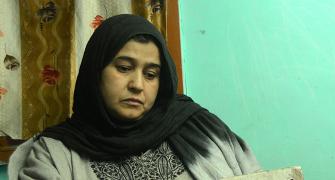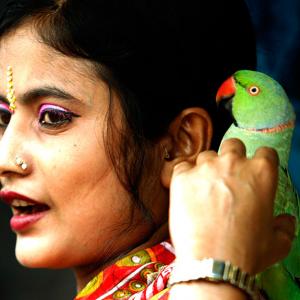Affaq Husain and his wife Saira built a Rs 100 crore empire preying on the most vulnerable people in society.
Rashme Sehgal reports on their rise and fall and how trafficking of young girls has reached frightening proportions.

Affaq Husain and his wife Saira, the kingpins of a strong trafficking racket, have forced thousands of vulnerable girls from the 24 Parganas district in West Bengal and Nepal into the flesh trade in the national capital.
Husain is known to use different ways of trapping young, underage girls.
Following the earthquake in Nepal in 2015, he went to Kathmandu with his key aides -- including a Nepali woman Piya Thapa.
Posing as an educationist, he toured the most vulnerable areas, asking parents to send their daughters with him to India where he would educate them. He also gave money to each family to help them rebuild their homes. No wonder they looked upon him and his team as saviours.
The girls were then smuggled into five brothels he owned on GB Road in New Delhi, including the notorious Kotha no 64.
Not only was this the biggest brothel on GB Road but also comprised several secret rooms and large wardrobes where girls would be hidden for hours in case of a police raid.
During the last 15 years, Husain and Saira had succeeded in trafficking over 5,000 girls.
Each girl was 'sold' for up to Rs 5 lakh.
No wonder, when they were finally caught, they had built up assets worth over Rs 100 crore (Rs 1 billion) -- including a swanky house in Friends Colony, outside which were parked a bevy of high-end foreign cars.
The couple had Rs 10 crore (Rs 100 million) in their bank account.
Their fall came about in the most innocuous manner.
The police found two trafficked girls, one a Bengali and the other a Nepali, in Kotha no 64.
As they looked underage, the police asked for their birth certificates.
One of Husain's managers handed over a certificate which was placed before the Child Welfare Committee. The certificate turned out to be forged and the CWC ordered an investigation.
Fresh raids were then conducted, leading to arrests of some of Husain's key aides. Two of them spilled the beans.
"There was so much incriminating evidence against Husain and his wife that the police decided to arrest them under Section 3 and 4 of MCOCA (the Maharashtra Control of Organised Crime Act) instead of registering an offence under the Immoral Trafficking Act," says Rishi Kant, who runs Shakti Vahini, a non-governmental organisation, and has been working to free girls trafficked to GB Road for the past three decades.
One reason why the police decided to book the couple under MCOCA was that then they could not apply for bail.
Saira was arrested in 1990 and was sentenced to a seven-year jail term. In 2001, following her release, they were back in business.
Two chargesheets were filed against them couple. The most recent was filed in March this year, which charged the couple with rape, trafficking, abduction and criminal conspiracy, but no action was taken against them.
It was obvious they enjoyed both political patronage and protection from the police.
In August-end, when the police was forced to arrest them, it led to the transfer of an unprecedented 127 policemen -- from the lowest beat constable right up to senior officers.
It also resulted in the closure of 35 of the 90 brothels functioning on GB Road.
On October 20, the police arrested Damodar Pandey, Afaq Husain and Saira's Nepalese manager, from the Kingsway Camp area in New Delhi. Pandey was Afaq's key henchman and played a key role in trafficking girls from Nepal.
"Whenever the police mounts a rescue operation, the traffickers, madams and pimps on GB Road receive a tip-off," says Rishi Kant. "The minor girls are then immediately shifted to Meerut, Jaipur and Agra. When the situation cools down, they are brought back."
One of the reasons why their trafficking trade reached these dimensions was that Saira had been a prostitute in her youth. She knew the ins-and-outs of her profession and through grit and determination, she succeeded in becoming a 'madam' at GB Road brothels.
Following her marriage to Husain, their work flourished and they succeeded in building up a vast network operating in the north-east and Nepal.
"We have created a task force which is reaching out to schoolgirls in 24 Parganas," says Rishi Kant, who is presently an adviser to the West Bengal government on how to end trafficking. "The police has also been sensitised and is now taking the issue more seriously."
P M Nayyar, retired director general of the Central Reserve Police Force who currently works with the Tata Institute of Social Sciences, Mumbai, on how to prevent trafficking, says the traffickers have succeeded in expanding their footprint across the globe, with girls being trafficked from Thailand, Bangladesh, Myanmar, Nepal, Sri Lank, and India's northeastern, southern states and tribal areas.
"Traffickers are using new technology," says Nayyar. "A girl reported missing in Nepal was to be found in Pune. Another girl missing in Bangladesh is recovered in Thane."
"The police and other investigating agencies need regional systems of technological integration across all SAARC nations to track these girls, because traffickers are using the garb of placement agencies, massage parlours, escort agencies etc to run these rackets," Nayyar adds.
"It is a mistake to think only poor tribal or under-privileged girls are being trafficked. Girls from all strata of society are being trafficked," he warns.
Nayyar feels that no realistic assessment has been done on how much money this trade generates.
"In Jharkhand," Nayyar says, "a couple was arrested with Rs 10 crore in assets. How did they succeed in making so much money?"
Lacunae in the law is one of the reasons why this human trade has flourished.
"If a parent registers a complaint of a missing child," Bharti Ali, who heads HAQ: Centre for Child Rights, points out, "the police will pass on this information to the trafficking department after four months. This gives traffickers enough time to smuggle the child into another state."
"The investigation on the missing child should be undertaken immediately," Ali emphasises, "because a kidnapped child is usually kept in the same vicinity for a few days before being taken to a new destination."
"The police just does not know how to tackle this situation," says Ali.
"Earlier, girls in the age group of 10 to 12 were being trafficked. Today, kids between 3 and 4 years are being trafficked for begging, pornography, etc. Young boys are also being trafficked in very large numbers," Ali adds.
Dr Sunita Krishnan, who heads the Bangalore-based NGO Parivartan, feels the only way this issue can be dealt with is if a consolidated effort is made by civil society and the government to fight this evil.
"HIV was fought at a national level. We need to do the same with trafficking," says Dr Krishnan. "Anti-trafficking has to be developed into a national programme with much better inter-state coordination."
Most of those tackling the issue at the grassroots level strike a despondent note while discussing the scale of the problem.
"We are failing. We are losing the fight against the traffickers," says Rishi Kant, "and the government must realise this. This is because no one wants to support the victims."
"I can cite you the example of a girl who was kidnapped from West Bengal and brought to Delhi. She has deposed before the court five to six times, but each time her case gets adjourned. The traffickers would hire the best lawyers and even the lower judiciary seems indifferent to their plight," says Rishi Kant.
"The victims receive no support. Ultimately, where should the vulnerable girls and women go? They don't get support from anyone."
Kindly note: Image published only for representational purposes. Photograph: Reuters










